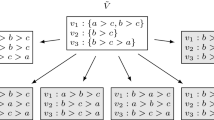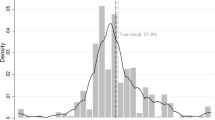Conclusions
While our experimental results do not show convincingly the superiority of our model over alternative hypotheses, these results do not reject the rational expectations approach to handling incomplete information in elections. This is not to say, of course, that our model provides the most appropriate treatment of incomplete information since it relies primarily on one source of information—polls. Certainly, other data exist—such as the historical record of the parties, primary election outcomes, and the coalitions observed at nominating conventions—which voters might use for information on their choices. What we hope our analysis has begun, however, is a more rigorous study of how citizens can interpret such data and the role played by the various media in supplying these data.
Admittedly, the model presented here endows uninformed voters with substantial computational abilities, since even the brightest subjects in our experiments found their tasks challenging. The question arises, then, as to whether we can expect average citizens — and, in particular, “uninformed” citizens — to be capable of using polls in the way assumed by our model. Our experiments show only that our model is feasible, not that it describes actual voting behavior. Such questions can be answered only by examining actual election data. Our model, nevertheless, serves as a counter-example to the oft-repeated presumption that our democratic institutions can function “properly” only to the extent that citizens are informed on public issues and the positions of election candidates on those issues. That we do not find citizens conforming or even approximating this normative ideal should not be interpreted to mean that our institutions cannot function as designed.
Similar content being viewed by others
References
McKelvey, R.D. and Ordeshook, P.C. (1984a) Sequential Elections with Limited Information, California Institute of Technology Working Paper 530.
(1984b) Elections with Limited Information: A Fulfilled Expectations Model Using Contemporaneous and Poll and Endorsement Data as Information Sources, Journal of Economic Theory, forthcoming.
(1984c) Elections with Limited Information: A Multidimensional Model, California Institute of Technology Working Paper 529.
Author information
Authors and Affiliations
Additional information
This research was supported by NSF grants to California Institute of Technology and Carnegie-Mellon University.
Rights and permissions
About this article
Cite this article
McKelvey, R.D., Ordeshook, P.C. Rational expectations in elections: some experimental results based on a multidimensional model. Public Choice 44, 61–102 (1984). https://doi.org/10.1007/BF00124819
Issue Date:
DOI: https://doi.org/10.1007/BF00124819




